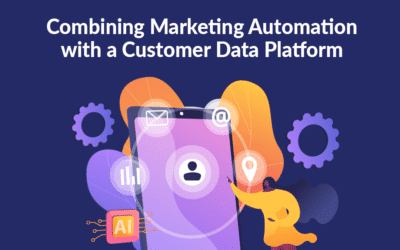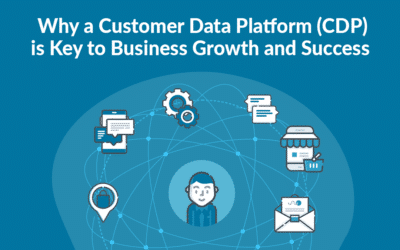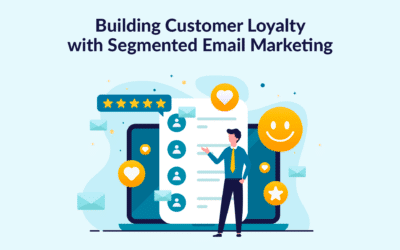Data-driven Personalization has become a top priority for businesses looking to connect with their customers on a deeper level. It goes beyond simply inserting a customer’s first name into an email or promotional message. Data-driven personalization is about understanding individual preferences, behaviors, and needs, and using that information to deliver tailored experiences. There is a powerful technology that can unlock the potential of personalized marketing. And take customer engagement to new heights with a Customer Data Platform (CDP). In this article, we will explore what a Customer Data Platform is. We will also discuss the benefits of integrating it with a Marketing Automation platform.
What is a Customer Data Platform (CDP)?
A Customer Data Platform (CDP) is a centralized system. It collects, integrates, and organizes customer data from multiple touchpoints and sources, including:
- Websites
- Mobile apps
- CRM systems
- Webshops
- POS systems
- Social media
- Customer service interactions
It creates a unified and comprehensive view of each customer. This is achieved by consolidating data from various interactions and channels. All this data can be used with your marketing automation platform. This enables data-driven personalization that resonates with your customers.
Key features of a CDP include:
- Data Integration
A Customer Data Platform (CDP) can seamlessly integrate data from diverse sources. It can do so irrespective of the data format or structure. This ensures that all customer data is captured and utilized effectively. - Data Unification
Creates a single customer profile by reconciling and merging data from various channels and touchpoints. This unified view allows marketers to gain a comprehensive understanding of each customer’s behavior and preferences. - Real-time Data Processing
Process data in real-time, ensuring that customer profiles are always up-to-date. Marketers can access the most recent information for personalized interactions and data-driven personalization. - Segmentation and Audience Creation
Enable marketers to segment customers based on various attributes and behaviors. This allows for targeted and relevant marketing campaigns. - Data Privacy and Compliance
Ensures data security and compliance with privacy regulations. This is achieved by providing granular control over data access and usage.
Deliver Tailored Experiences to any Customer
Think of a Customer Data Platform (CDP) as a personalization powerhouse. It brings together data from various touchpoints and sources. Then, it transforms it into valuable insights and actionable strategies. This rich customer profile allows businesses to gain deep insights into individual preferences and behaviors. It enables them to highly craft data-driven personalization and relevant experiences.
One of the key benefits of leveraging a Customer Data Platform (CDP) for data-driven personalization is enhanced customer experience. Personalized marketing campaigns create a seamless and relatable experience for customers. This makes them feel valued and understood. When a customer receives a message that speaks directly to their interests, needs, or past interactions with a company, it creates a sense of connection. As a result, it builds loyalty that you can convert to business!
Another benefit of data-powered personalization is improved engagement. By understanding customers’ unique preferences, businesses can deliver content or offers that are more likely to resonate with them. This leads to higher engagement rates, increased conversions, and ultimately, more revenue. Imagine receiving an email or an SMS that recommends products or services you’re genuinely interested in. It’s far more likely to capture your attention and drive you to act.
Data-driven personalization ensures contextual relevance in every channel
Handling data-driven personalization with a Customer Data Platform (CDP) also enables contextual relevance. By analyzing and using real-time customer data, businesses can deliver timely and relevant content to customers based on their current needs and interests. For example, a retail brand can send personalized offers based on a customer’s browsing history or previous purchases. By tailoring messages to individual customers’ preferences, businesses increase the chances of conversions and create a stronger connection with their audience.
A Customer Data Platform (CDP) enables omnichannel consistency. In the multi-channel world, customers interact with companies through various touchpoints and channels.
Keeping messaging consistent across all these channels can be a challenge. But a Customer Data Platform (CDP) makes it possible. By integrating and analyzing data from different sources, businesses can ensure the consistency of their data-driven personalization. They can also ensure the consistent delivery of customer experiences across all touchpoints. This consistency creates a seamless journey for customers.
Ensuring Data Privacy Compliance for Personalized Marketing
Data privacy and compliance is also a critical aspect of personalized marketing. Regulations and concerns about data privacy are increasing. As a consequence, businesses must take steps to secure customer data. Additionally, they need to be responsible when managing and handling it. A Customer Data Platform (CDP) provides a solution by centralizing data management. It also offers transparency and control over customer data. With a Customer Data Platform (CDP), companies can ensure compliance with data privacy regulations. Simultaneously, they can deliver data-driven personalization and customer experiences built on trust.

How CDPs Drive Customer Engagement and Business Success
Customer Data Platforms (CDPs) have immense potential in enabling data-driven personalization for:
- Marketing
- Customer care
- Sales processes
Companies that embrace this technology will thrive in the age of personalization. They can harness the power of their customer data to achieve success. By leveraging a Customer Data Platform (CDP), companies can collect, integrate, and analyze vast amounts of customer data. This enables them to gain deep insights into individual preferences and behaviors. As a result, they can provide very personalized experiences that connect with their target audience. These experiences drive engagement and, in the end, foster the development of a devoted customer base.
Benefits of Using a CDP with a Marketing Automation Platform for Data-driven Personalization
- Holistic Customer View
Integrating a Customer Data Platform (CDP) with a Marketing Automation platform provides companies with a 360-degree view of each customer. This comprehensive understanding allows for more personalized and relevant interactions across all touchpoints. It leads to improved customer engagement and loyalty. - Data-Driven Decision Making
Empowers companies with accurate and real-time customer data, enabling data-driven decision-making. Companies can identify trends, preferences, and customer behavior patterns to optimize processes and campaigns. And then allocate resources more effectively. - Enhanced and data-driven personalization
Personalized marketing is a key driver of customer satisfaction and conversion rates. By leveraging the insights gained from the collected customer data, the Marketing Automation platform can deliver tailored content, product recommendations, and offers to individual customers. This personalized approach fosters a stronger bond between the brand and the customer. - Omni-channel Marketing
Companies can orchestrate omnichannel marketing campaigns with data-driven personalization seamlessly and automatically. The Marketing Automation platform can use unified customer data to deliver consistent and cohesive messaging across multiple channels. This ensures a smooth customer experience regardless of the touchpoint and channel. - Improved Customer Segmentation
Enables sophisticated customer segmentation based on a wide range of attributes and behaviors. This allows companies to create highly targeted and relevant campaigns for specific customer segments. As a result, it increases the chances of conversion and retention. Segmentation is the key to data-driven personalization! - Automated Customer Journey
Integrating a CDP with a Marketing Automation platform creates automated customer journeys. Marketers can design and deploy personalized and automated flows triggered by specific customer actions or events. For example, abandoned carts, re-engagement, and post-purchase follow-ups. - Reduced Customer Churn
By understanding customer preferences and behavior through the Customer Data Platform (CDP), the Marketing Automation platform can implement proactive measures to reduce customer churn. Automated re-engagement campaigns, special offers, and personalized content can help retain customers and turn them into brand advocates. - Optimized Marketing ROI
It is important that the CDP provides a clear picture of campaign performance and customer interactions. That way the marketing automation platform can fine-tune marketing efforts for maximum ROI. Companies can then allocate budgets to the most effective channels and campaigns. This leads to minimizing wastage and maximizing results.
Delivering data-driven personalization with a CDP is a powerful way for putting valuable data to use. Its integration with a marketing automation platform enhances efficiency. It also increases the impact of marketing efforts. With a holistic view of customers, marketers can
- Deliver personalized experiences
- Optimize campaigns
- Foster long-lasting customer relationships
A CDP alongside Marketing Automation is a strategic move for businesses seeking to excel in their industry. It allows them to cater to the evolving expectations of modern consumers.
Data-driven personalization is not just about adding the data field “FIRST NAME” to your campaigns. The age of data-driven personalization is now!
This blog post has also appeared in a MarketingPlatform Newsletter.
Author: Theodor Nørgaard, head of marketing & digital
Try MarketingPlatform for free for 14 days
The trial period is free, completely non-binding and expires after 14 days if you do not wish to continue.
When you sign up, you will also receive our educational flow via a series of emails along with our newsletter with regular updates.




